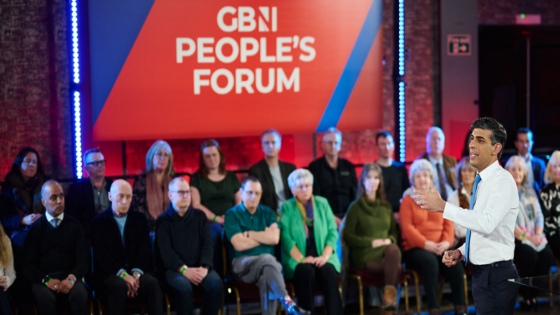Ofcom announced yesterday that GB News People’s Forum with The Prime Minister breached rules.
The regulator announced that the Forum broke impartiality rules and is threatening the channel with a sanction.
GB News however hit back and stressed it could not understand how the programme lacked the “appropriately wide range of significant views” required to uphold due impartiality.
A GB News spokesman said: “Ofcom’s finding against GB News today is an alarming development in its attempt to silence us by standing in the way of a forum that allows the public to question politicians directly.
“The regulator’s threat to punish a news organisation with sanctions for enabling people to challenge their own prime minister strikes at the heart of democracy at a time when it could not be more vital.
“GB News is the People’s Channel. That is why we created a new broadcasting format, The People’s Forum, which placed the public – not journalists – firmly in charge of questioning Rishi Sunak.
“Our live programme gave an independently selected group of undecided voters the freedom to challenge the Prime Minister without interference.
“They did this robustly, intelligently, and freely. Their 15 questions, which neither we nor the Prime Minister saw beforehand, kept him under constant pressure and covered a clearly diverse range of topics. These were their words on the issues that mattered to them.
“Among many other challenges, the Prime Minister was criticised over the ‘chronic underfunding’ of social care, the housing shortage, the likely failure of his government’s Rwanda plan, the betrayal of those injured by the Covid vaccine, and asked why the LGBT community should vote for him.
“We cannot fathom how Ofcom can claim this programme lacked the ‘appropriately wide range of significant views’ required to uphold due impartiality. It did not.
“We maintain that the programme was in line with the Broadcasting Code.
“Ofcom is obliged by law to uphold freedom of speech and not to interfere with the right of all news organisations to make their own editorial decisions within the law.
“Its finding today is a watershed moment that should terrify anyone who believes, as we do, that the media’s role is to give a voice to the people of the United Kingdom, especially those who all too often feel unheard or ignored by their politicians.
“We are proud to be the People’s Channel and we will never stop fighting for the right of everyone in the UK, whatever their political persuasion, to have their perspective heard.”
As voters head to the polls later this year, it is vital that broadcasters are able to properly hold politicians to account, and that does not always mean badgering them through press conferences with Westminster reporters or by TV presenters.
GB News and the Prime Minister had no idea what the questions would be, or even who the audience members were.
They were selected by independent pollsters to be representative of a wide range of views and featured people from all over the country.
Does Ofcom really believe people cannot think critically and live in a vacuum of an hour-long news programme? This is not the 1970s when there were just three TV channels.
People have access to boundless amounts of information on where all the political parties stand, and Britain has a healthy and large dose of cynicism and scepticism when it comes to taking politicians at their word.
When Sunak answered questions in the People’s Forum, viewers understood that he spoke from his own perspective, with his own spin and bias, and can be judged as such.
For democracy to function, freedom of speech, freedom of the press and the ability of voters to interrogate their politicians are fundamental.
With that in mind, do you think that freedom of democracy is under threat in this country? Have your say.
Source Agencies



